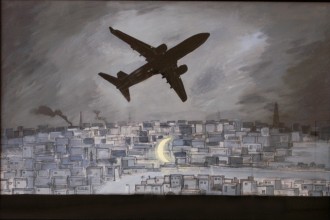From Gary Shytengart to Kim Jong Il, from Twitter’s ‘bats of darkness’ to golf’s greatest round (allegedly), this week’s round-up brings you breaking news and broken news from around the literary world…
CANADA
 Taking his place in a rich tradition of Americans who have offended Canadians, Gary Shytengart revealed that, when judging Canada’s premier book award last year, ‘Out of a million entries, we found four or five really good ones.’ He went on to suggest that Canadian writers didn’t take risks because ‘they want to please the Ontario Arts Council, or whatever it is.’ But apparently Shytengart was ‘in a drunken stupor’ at the time of the interview, so all is forgiven.
Taking his place in a rich tradition of Americans who have offended Canadians, Gary Shytengart revealed that, when judging Canada’s premier book award last year, ‘Out of a million entries, we found four or five really good ones.’ He went on to suggest that Canadian writers didn’t take risks because ‘they want to please the Ontario Arts Council, or whatever it is.’ But apparently Shytengart was ‘in a drunken stupor’ at the time of the interview, so all is forgiven.
NORTH KOREA
 Was there no end to Kim Jong Il’s talents? North Korea’s answer to Renaissance man, scorer of 11 holes-in-one during his first and only round of golf, was also the author of 1500 books, including ‘Life and Literature’. ‘[Literature] describes people and their lives, people who live, breathe, think and act as they do in real life,’ explains the murderous despot-cum-critic, a man whose puppet alter ego’s lallations will live on long after his services to literature have been forgotten.
Was there no end to Kim Jong Il’s talents? North Korea’s answer to Renaissance man, scorer of 11 holes-in-one during his first and only round of golf, was also the author of 1500 books, including ‘Life and Literature’. ‘[Literature] describes people and their lives, people who live, breathe, think and act as they do in real life,’ explains the murderous despot-cum-critic, a man whose puppet alter ego’s lallations will live on long after his services to literature have been forgotten.
SAUDI ARABIA
 Badryah al-Bishr’s ‘Love Stories on al-Asha Street’ is one of only two books by female authors on the longlist for 2014’s International Prize for Arabic Fiction. al-Bishr, a lecturer at King Saud University, is an outspoken journalist and has previously described ‘Islamic sectarian hate-mongers’ as ‘bats of darkness on Twitter’. The shortlist is set to be announced in Amman on February 10, with Khaled Khalifa’s ‘No Knives in this City’s Kitchens’ (winner of the Mahfouz Medal) perhaps an early favourite.
Badryah al-Bishr’s ‘Love Stories on al-Asha Street’ is one of only two books by female authors on the longlist for 2014’s International Prize for Arabic Fiction. al-Bishr, a lecturer at King Saud University, is an outspoken journalist and has previously described ‘Islamic sectarian hate-mongers’ as ‘bats of darkness on Twitter’. The shortlist is set to be announced in Amman on February 10, with Khaled Khalifa’s ‘No Knives in this City’s Kitchens’ (winner of the Mahfouz Medal) perhaps an early favourite.
TURKEY
 Words Without Borders began 2014 with a special issue on Kurdish literature, including Alber Sabanoglu’s essay on Turkish writers ‘facing the Kurdish past.’ ‘The recent appearance of a series of fiction and nonfiction works which… try to confront the real history of the country’s mainly Kurdish southeastern regions has come as a surprise… the subject was considered taboo or too dangerous to touch until recently,’ writes Sabanoglu, citing a collection of interviews entitled ‘It Is Not as You Know It’.
Words Without Borders began 2014 with a special issue on Kurdish literature, including Alber Sabanoglu’s essay on Turkish writers ‘facing the Kurdish past.’ ‘The recent appearance of a series of fiction and nonfiction works which… try to confront the real history of the country’s mainly Kurdish southeastern regions has come as a surprise… the subject was considered taboo or too dangerous to touch until recently,’ writes Sabanoglu, citing a collection of interviews entitled ‘It Is Not as You Know It’.




